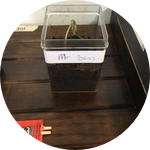About This Project
Fertilizers used in agriculture have significant environmental effects like toxic algal blooms and biodiversity loss. Legumes are a crop with their own method of supplying nitrogen for growth: a symbiotic relationship with rhizobia. Rhizobia can convert atmospheric nitrogen into a form usable by plants, although not all rhizobia fix nitrogen. We hypothesize that by improving rhizobia’s ability to fix nitrogen we can offer an eco-friendly way to improve crop production.
Ask the Scientists
Join The DiscussionWhat is the context of this research?
Legumes have the unique ability to form a symbiotic relationship with nitrogen-fixing bacteria, Rhizobia. As a result, they require little to no fertilizer and are ideal for soil revitalization to grow other crops. Improving and expanding the benefits of rhizobia colonization can promote decreased fertilizer use while improving crop quality. Bean plants inoculated with rhizobia engineered to overexpress a gene tied to trehalose synthesis has been shown to increase nitrogen fixation, as well as increase crop yields and tolerance to environmental stressors. Trehalose is a sugar used by many organisms to survive freezing or droughts. This research will be used to develop the next generation of rhizobial inoculants and eventually improve plants beyond legumes.
What is the significance of this project?
The overuse of nitrogen-rich fertilizers causes massive ecological damage worldwide, such as toxic algal blooms, which can poison animals and humans, and dead zones, which are deoxygenated bodies of water that negatively affect marine life and even coral. Dead zones have the potential to greatly damage not only coastal ecosystems but also coastal economies. In 2015, the landings revenue of the Gulf of Mexico totaled $858 million, making it the fourth most profitable region nationwide that year. Reducing the need for nitrogenous fertilizers is critical for the development of an economically and ecologically sustainable future. Improving the success rates of rhizobia/legume symbiosis could be the first step in eliminating the need for expensive fertilizers and in building that future.
What are the goals of the project?
Overexpressing otsA (a gene responsible for trehalose biosynthesis) in rhizobia has been shown to improve the drought and frost resistance of the plant, and increase nitrogenase activity and crop yields. We will verify these findings by applying the Rhizobium strain overexpressing otsA (Ox) to Phaseolus vulgaris and examining its effect on nodule formation, biomass, and stress-resistance. Then we will determine whether Ox is beneficial to other types of legumes. This data will determine whether Ox benefits are species-specific or general. For legumes that do not respond to Ox, we will examine other trehalose-synthesis pathways to identify a new candidate gene to promote trehalose production. Our goal is to create the next generation of rhizobia inoculants that will improve plant growth.
Budget
Our budget includes laboratory supplies such as gloves, pipette tips, cloning reagents, chemicals, and culture media to create and test engineered bacteria overexpressing genes within the trehalose biosynthetic pathways. There will also be costs for sequencing DNA and acquiring Rhizobia and E. coli strains.
In order to test the effects of our genetically modified rhizobia, we need plants to inoculate and grow. The materials needed for growing plants under standardized conditions include pots, soil, grow lights, temperature and humidity sensors, seeds, soil test kits for pH, nitrogen, phosphorus, and potassium, and fabrication supplies.
The iGEM competition requires that at least one team member attends Giant Jamboree. We have included the registration of one team member in this budget.
Endorsed by
 Project Timeline
Project Timeline
We have begun planting control seeds to determine germination rates and select our first legume candidates. We will use commercial rhizobia inoculant to validate the assays used to determine whether the Ox strain will improve plant growth and stress-resistance. At the same time, we will acquire or clone the trehalose synthase gene into rhizobia and then measure its effects on plants. We will share our results in November online and at iGEM Giant Jamboree!
May 01, 2019
Plant Control Organisms
May 14, 2019
Project Launched
May 24, 2019
Test Commercial Inoculum and Develop Measurement Protocols
Jun 01, 2019
Clone Trehalose Synthase Gene to make Ox Strain
Jul 01, 2019
Test Effect of Ox Strain
Meet the Team
Team Bio
The Tacoma RAINmakers is a team of 24 high school and undergraduate students from 13 different schools all over the Tacoma, WA area. They are sponsored by RAIN Incubator and are a Community Lab Team.
Judy Nguyen
I am the head scientist for RAIN Incubator, a startup nonprofit dedicated to improving the life sciences and biotech ecosystem in Tacoma, WA, and principal investigator for the iGEM team, the Tacoma RAINmakers. My background is in molecular and cell biology and neuroscience, and I have an interest in public health and biodefense. The combination of these interests has led me to pursue projects related to the development of detection methods for health- or environmentally-related targets.
Catherine Ryan
I joined RAIN as a volunteer in September of 2017 before beginning an internship under Head Scientist, Dr. Judy Nguyen. Currently, I am developing an isothermal DNA amplification technique for the detection of environmental DNA, building assays for RAIN's educational programs, and leading the iGEM Team's Wet Lab work.
Sonika Nigam
I joined the IGEM team as a team member in February of 2019. I got introduced to RAIN and IGEM by a family friend who was part of the team last year. I am interested in sciences, specifically synthetic biology. Currently, I am involved in three teams for the IGEM team. I am part of design and media, wiki team, and presentation team. I plan to continue with the IGEM team till graduation.
Sophia Terrill
I am 15 years old and am a sophomore at Tacoma Science and Math Institute. I joined iGEM in February of 2019 to learn more about the field of microbiology and gain experience in the field. I hope to have a career in science surrounding medical or engineering topics. Outside of iGEM I like to stay active by competitively climbing, hiking and biking. I also enjoy cooking, reading, playing games as well as playing soccer with friends.
Project Backers
- 33Backers
- 107%Funded
- $3,083Total Donations
- $93.42Average Donation




